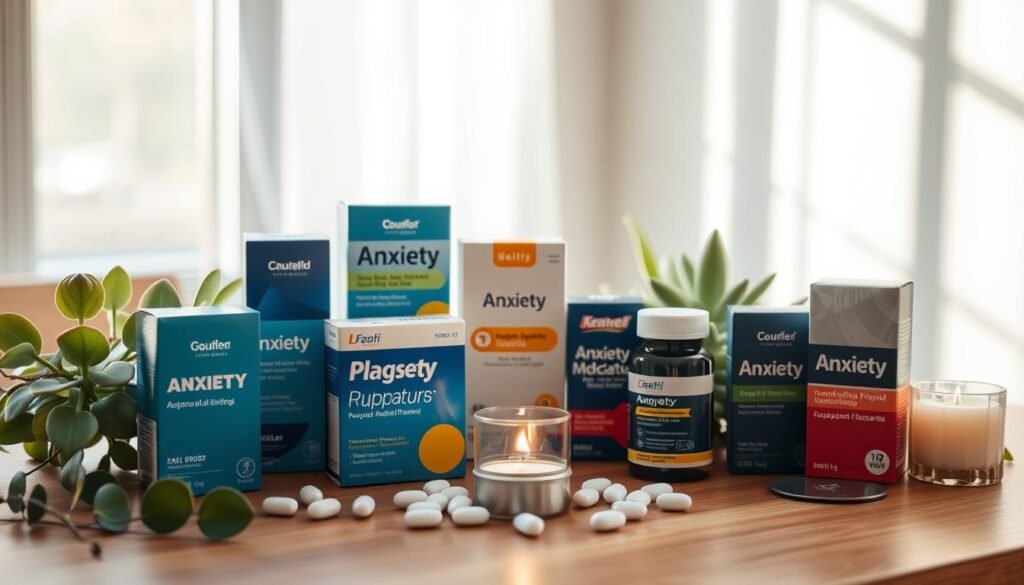Over 19% of the U.S. population battles with anxiety disorders. That’s 1 in 3 people dealing with generalized anxiety disorder (GAD). This fact points to a major need for effective treatments. With anxiety rising, especially among the young, it’s key to know how anxiety meds help. These drugs are vital in easing symptoms and offering hope.
To use these treatments well, understanding the basics is important. We need to know how anti-anxiety drugs work in the brain. This guide will look into the different anxiety meds available. It aims to give you a good understanding of how to treat anxiety.
Key Takeaways
- Over 19% of Americans are affected by anxiety disorders.
- Benzodiazepines and SSRIs are commonly prescribed medications.
- Understanding medication mechanisms is essential for effective treatment.
- Anxiety medications can provide significant relief from symptoms.
- Self-care practices complement medication in managing anxiety.
- Awareness of side effects is crucial for safe usage.
The Role of Medication in Anxiety Treatment
For many, medication is key in handling anxiety disorders. It helps those whose daily lives are affected by anxiety to function better. Medicines like benzodiazepines and SSRIs are often used. Benzodiazepines, such as Xanax and Valium, work fast but are usually meant for short use. They can lead to dependence and withdrawal issues.
SSRIs like Prozac and Zoloft need 4 to 6 weeks to start working. Though they’re widely used, some studies question their superiority over placebos. Side effects include tiredness, nausea, or weight gain.
Using anxiety meds for a long time has its downsides. With benzodiazepines, you might need more over time to feel the same effect. Stopping them can cause withdrawal, which includes more anxiety or even seizures. This is particularly true for older people. They could suffer more from the sedative aspects and memory issues.
Always talk to a doctor before starting or changing meds. Medication for anxiety is part of a bigger mental health strategy. This can also include therapy and lifestyle changes.
Understanding Anxiety Medications Mechanism
Anxiety meds are crucial for many. They target the brain’s chemistry to help mood. They work by boosting neurotransmitters like serotonin and norepinephrine. This helps lessen anxiety symptoms.
Brain chemistry plays a big part in how anxiety medicines work. SSRIs, for example, keep serotonin in the brain longer. But, results can vary. Up to half of patients might not get better with these meds. Many also face mild side effects.
Many patients stop taking their meds within six months. This shows how personal treatment can be. Getting better can take 10–12 weeks or more. When meds don’t work, it can be really tough for those with severe anxiety.
Understanding how these meds work can shed light on different treatments. Buspirone works by affecting serotonin receptors, which might boost mood. Benzodiazepines calm the nerves, helping with immediate relief. Beta blockers are useful for physical symptoms like a fast heartbeat. This shows the wide range of options out there.
| Medication Type | Mechanism of Action | Common Use | Side Effects |
|---|---|---|---|
| SSRIs | Inhibit serotonin reuptake | Long-term anxiety management | Nausea, insomnia, sexual dysfunction |
| Benzodiazepines | Enhance GABA activity | Short-term anxiety relief | Drowsiness, dependence risk |
| Buspirone | Serotonin receptor agonist | Generalized anxiety disorder | Dizziness, headache |
| Beta Blockers | Block beta receptors | Situational anxiety | Fatigue, cold extremities |
How Do Anxiety Meds Work: The Science Behind Treatments
Anxiety meds are key in treating disorders like generalized anxiety disorder and panic disorder. They work by affecting neurotransmitters, which help nerve cells talk to each other. Knowing how anxiolytics mode of action works explains why they help with anxiety.
Neurotransmitter Interaction in Anxiety
Anti-anxiety drugs calm the brain’s limbic system, which affects emotions. This part of the brain is often too active in those with anxiety. SSRIs and SNRIs, for example, increase serotonin and norepinephrine to improve mood and lessen anxiety.
The Impact on Brain Chemistry
Benzodiazepines are another type of anxiety med. They boost GABA, a neurotransmitter that reduces nerve cell activity, leading to a calming effect. Since they can be addictive, they’re usually prescribed for short periods. For those who don’t find SSRIs effective, buspirone can be a non-addictive alternative.

Beta-blockers help with anxiety too, especially in situations like public speaking. They ease symptoms such as a fast heartbeat. Always talk to a healthcare provider to find the right treatment for you. Knowledge about how these meds work can help people understand how to manage anxiety better. For more info, check out this detailed overview.
Types of Anxiety Medications
There are many types of anxiety medications. Each type has different benefits and risks. Here’s a guide to the main types of anxiety medications, how they work, and their unique features.
Benzodiazepines
Benzodiazepines offer quick relief for acute anxiety. They start working right away. Common ones include:
- Alprazolam (Xanax)
- Clonazepam (Klonopin)
- Diazepam (Valium)
- Lorazepam (Ativan)
These medications work well for short-term use. However, their potential for dependence and addiction is a concern. They are usually not recommended for long-term treatment.
SSRIs and SNRIs
SSRIs and SNRIs are often the first choice for treating anxiety disorders. Examples include:
- Escitalopram (Lexapro)
- Fluoxetine (Prozac)
- Venlafaxine (Effexor)
It can take a few weeks to see improvements with these medications. They are considered safer and have fewer side effects than benzodiazepines. SSRI anxiety treatment helps by increasing serotonin in the brain, which can improve mood and lower anxiety.
Buspirone and Other Alternatives
Buspirone offers a different approach to anxiety management. It affects serotonin and dopamine receptors. It doesn’t cause drowsiness or cognitive issues. Side effects might include dizziness and headaches. But, it’s less likely to be habit-forming. So, it’s a good option for many anxiety types.
Options like hydroxyzine, an antihistamine, can also help. They provide short-term relief by reducing activity in the brain’s central nervous system. They don’t carry the same risk as controlled substances.
| Medication Type | Primary Use | Onset of Action | Dependence Risk |
|---|---|---|---|
| Benzodiazepines | Acute anxiety relief | Immediate | High |
| SSRIs/SNRIs | Long-term anxiety treatment | 4-6 weeks | Low |
| Buspirone | Generalized anxiety disorder | Several weeks | Very low |
| Hydroxyzine | Short-term anxiety relief | 30 minutes | None |

Benzodiazepines: Effects and Side Effects
Benzodiazepines are often prescribed for anxiety and insomnia. They boost the activity of a neurotransmitter called gamma-aminobutyric acid (GABA). GABA helps reduce nerve activity, causing a calming effect. This helps with anxiety symptoms and sleep.
How Benzodiazepines Function
Benzodiazepines work by causing CNS depression. This allows chloride ions to flow into neurons. As a result, neurons find it harder to activate. Users may feel sedated, less anxious, and their muscles may relax. Drugs like Xanax, Valium, and Ativan are among the most common.
Commonly Prescribed Benzodiazepines
- Xanax (Alprazolam): Mainly for anxiety and panic disorders.
- Valium (Diazepam): Helps with anxiety and alcohol withdrawal.
- Ativan (Lorazepam): Used for generalized anxiety disorders.
- KlonoPIN (Clonazepam): Good for panic disorder and some seizures.
- Restoril (Temazepam): Aids in falling and staying asleep.
Each drug differs in strength, speed of absorption, and body interaction. That’s why personalized healthcare is key.
Potential for Dependence and Withdrawal
Although beneficial, long-term benzodiazepine use has downsides. Over time, you might need higher doses for the same effect. This can lead to addiction. Stopping usage can cause withdrawal symptoms like anxiety, tremors, and seizures. It’s vital healthcare providers monitor usage closely.
It’s important to use these medications as prescribed to avoid risks. Limit benzodiazepines to short-term use and never mix with alcohol or opioids. For more details on benzodiazepines, visit this resource.

SSRI and SNRI Anxiety Treatments
SSRIs and SNRIs are both key in treating anxiety. They work with neurotransmitters in the brain but in different ways. This affects how well they work and their side effects. Knowing the difference between them can help people choose the best treatment.
Comparison of SSRIs and SNRIs
SSRIs boost serotonin levels in the brain by blocking its reuptake. Some well-known SSRIs include citalopram, escitalopram, and fluoxetine. On the other hand, SNRIs affect both serotonin and norepinephrine. Venlafaxine and duloxetine are common SNRIs. Studies show both SSRIs and SNRIs work for social anxiety, but SNRIs might be better for severe depression.
Side Effects and Considerations
SSRIs usually have fewer side effects compared to SNRIs. However, they can still cause anxiety, sleep issues, and fatigue. They might also lead to rare side effects like vision problems or irregular heartbeats with high doses. SNRIs can cause nausea and dizziness among other side effects. It’s key to work closely with a doctor to manage these issues and find the right treatment plan.
The Use of Beta Blockers in Anxiety Management
Beta blockers have become known for their role in beta blockers anxiety treatment. They were first made to help with heart issues. Medicines like propranolol and atenolol are now also used for managing anxiety. A study in 2016 showed that propranolol can be as helpful as benzodiazepines for some anxiety disorders. They are especially good for times of public speaking or performing.
Beta blockers for anxiety management help with physical anxiety signs like fast heartbeats or sweating. But, they are not as helpful for long-term use. They work best for anxiety in certain situations, not for ongoing anxiety issues.
It’s important to know beta blockers might not work well for social phobias. Side effects can include feeling tired, dizzy, or having cold hands and feet. Serious issues like an irregular heartbeat or low blood sugar need doctor’s care right away. People with asthma or low blood sugar should be careful with beta blockers.
About 30 million adults in the U.S. take beta blockers, making them common medications. The FDA approved them mainly for heart issues. So, their use for anxiety is considered “off-label.” Talking to doctors is key, especially about how these medications mix with other drugs.
Methods like deep breathing can also help manage anxiety along with beta blockers. For ongoing anxiety, it’s important to talk to healthcare professionals. They can help find the best treatment plan.
| Beta Blockers | Common Side Effects | Serious Side Effects | Recommended Usage |
|---|---|---|---|
| Propranolol | Fatigue, cold hands and feet, headaches | Irregular heartbeat, low blood sugar | Situational anxiety (e.g., stage fright) |
| Atenolol | Dizziness, gastrointestinal issues | Asthma attack, fluid retention | Short-term anxiety management |
| General Use | Dry mouth or eyes, insomnia | N/A | Off-label for anxiety disorders |
For more insights on anxiety medications and their effects, visit this helpful guide.
Buspirone: A Unique Approach to Treating Anxiety
Buspirone is not your ordinary anxiety treatment. Unlike others, it takes a unique path to ease symptoms. Approved by the FDA in 1986, it boosts serotonin and dials down dopamine in the brain. This makes it a top pick for those with generalized anxiety disorder (GAD), especially if they’re concerned about usual medication side effects.
What really makes buspirone stand out is its lower risk of addiction and lack of drowsiness. It’s a good fit for many people, including the elderly and those who’ve struggled with substance use. Although it might take a few weeks to kick in, its effectiveness is solid. People can take it with food or on an empty stomach, usually between 15 mg to 30 mg daily, but never more than 60 mg.
Some might experience dizziness, nausea, or headaches, but these side effects are typically milder than those from other anxiety meds. However, it’s crucial to watch out for rare, serious reactions like allergies that require quick medical help. For further details on buspirone’s safety and effectiveness, click here. Given its special benefits, buspirone is an important option for managing anxiety.